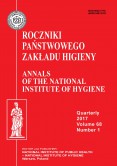Rocz Panstw Zakl Hig 2019, 70(4): 337-345
Importance of diet in reducing cancer incidence in Poland: a review
[Importance of diet in reducing cancer incidence in Poland: a review]
ABSTRACT
Cancer is one of the leading causes of death in most countries in the world. In Poland, after cardiovascular disease, cancer is the leading cause of death, and the number of malignant tumors has more than doubled in the last three decades. Increased cancer mortality in the immediate future is expected to be mainly associated with lung cancer caused by smoking (both sexes), colorectal cancer (both sexes), breast cancer in women, and prostate cancer in men. It is estimated that 20 to 30% of all malignant tumors are diet-dependent, in which cases the cancer-inducing factors are the nutritional components of the food and the ‘hygiene’ of eating. Research by the Institute of Food and Nutrition in Warsaw indicates that an important factor in the prevention of cancer is also the individual’s state of awareness concerning diet. It is emphasized that running nutritional education programs, especially for children and adolescents, may help to limit the occurrence of diet-dependent cancers in Poland over the next few decades. The aim of this review is to assist the promulgation of knowledge about the importance of a high-quality diet in the prevention of cancer. The need for such knowledge is indicated by the upward trend in the incidence of these types of disease in Poland.
STRESZCZENIE
Choroby nowotworowe stanowią jedną z głównych przyczyn zgonów w różnych krajach świata. W Polsce nowotwory obok chorób układu krążenia są jedną z przyczyn największej ilości zgonów, a liczba zachorowań na złośliwe rodzaje tych schorzeń wzrosła ponad dwukrotnie w ciągu ostatnich trzech dekad. Umieralność z powodu prognozowania dotyczące dalszego wzrostu ilości tych zachorowań, związane są głównie z paleniem tytoniu i dotyczą nowotworów jelita grubego u obu płci oraz nowotworów płuca oraz piersi u kobiet, jak również prostaty w populacji mężczyzn. Uznaje się, że około 20 – 30% wszystkich nowotworów złośliwych stanowią nowotwory dietozależne, w których czynnikiem indukującym raka są składniki żywieniowe oraz higiena odżywiania. Badania Instytutu Żywności i Żywienia w Warszawie wskazują, że ważnym czynnikiem profilaktyki zachorowalność na nowotwory złośliwe jest również stan świadomości związanej ze stosowaną dietą. Podkreśla się również, że prowadzenie edukacji żywieniowej już u dzieci i młodzieży może ograniczać występowanie nowotworów dietozależnych w Polsce. Celem niniejszego artykułu jest popularyzacja wiedzy na temat jakości diety stosowanej w profilaktyce chorób nowotworowych, z uwagi na niekorzystną tendencję wzrostową zachorowalności na te rodzaje schorzeń w Polsce.
Liczba pobrań: 3281


